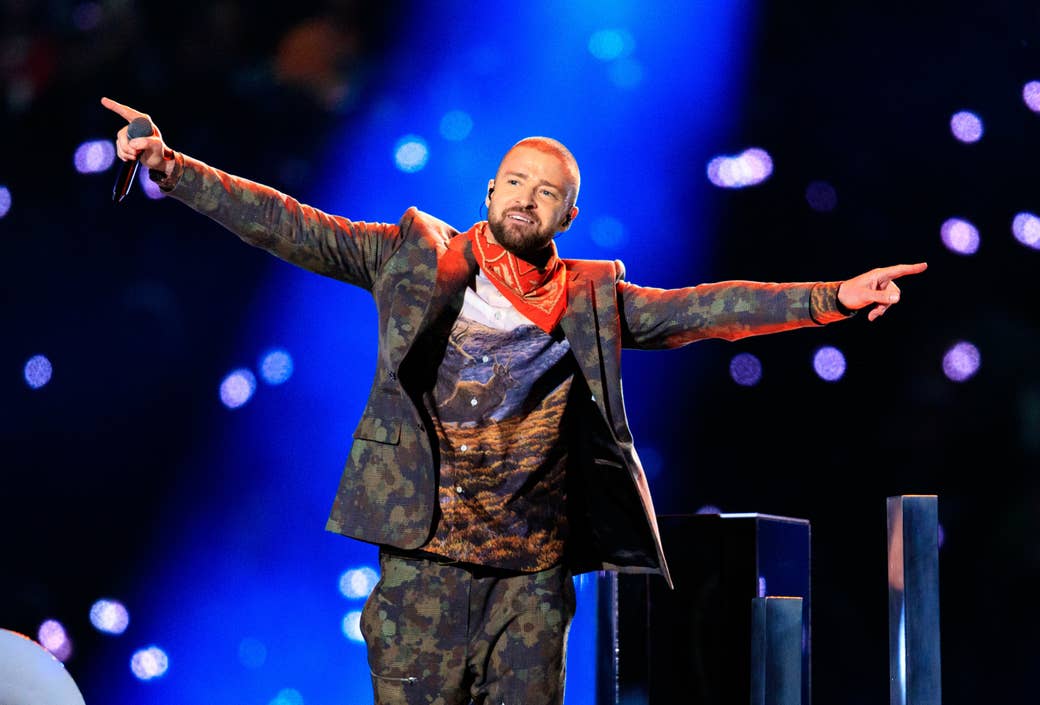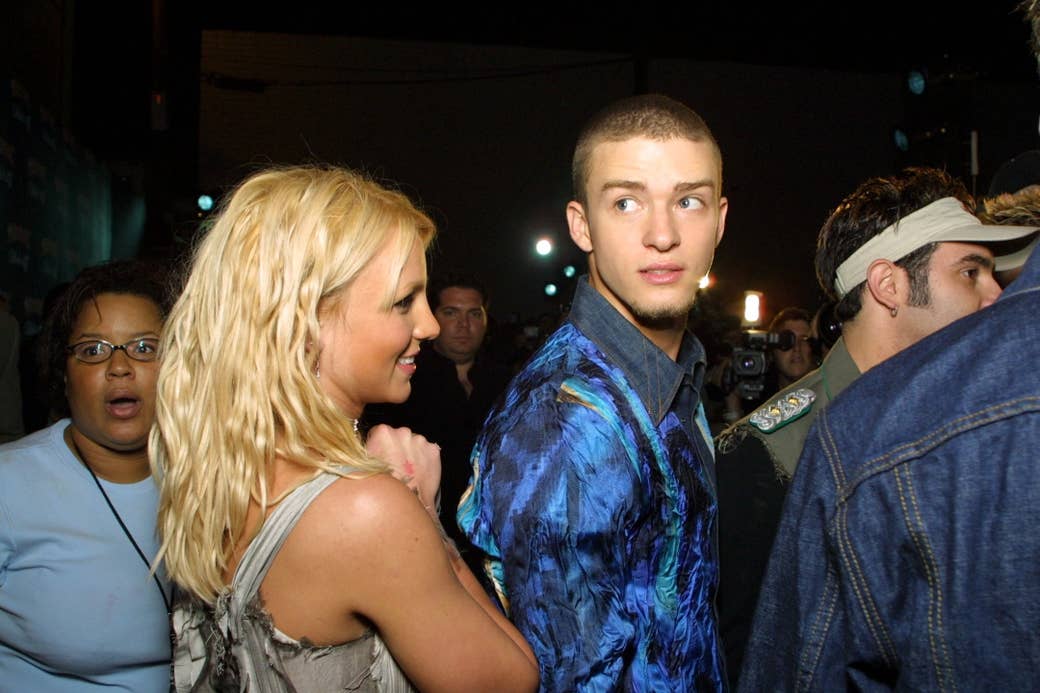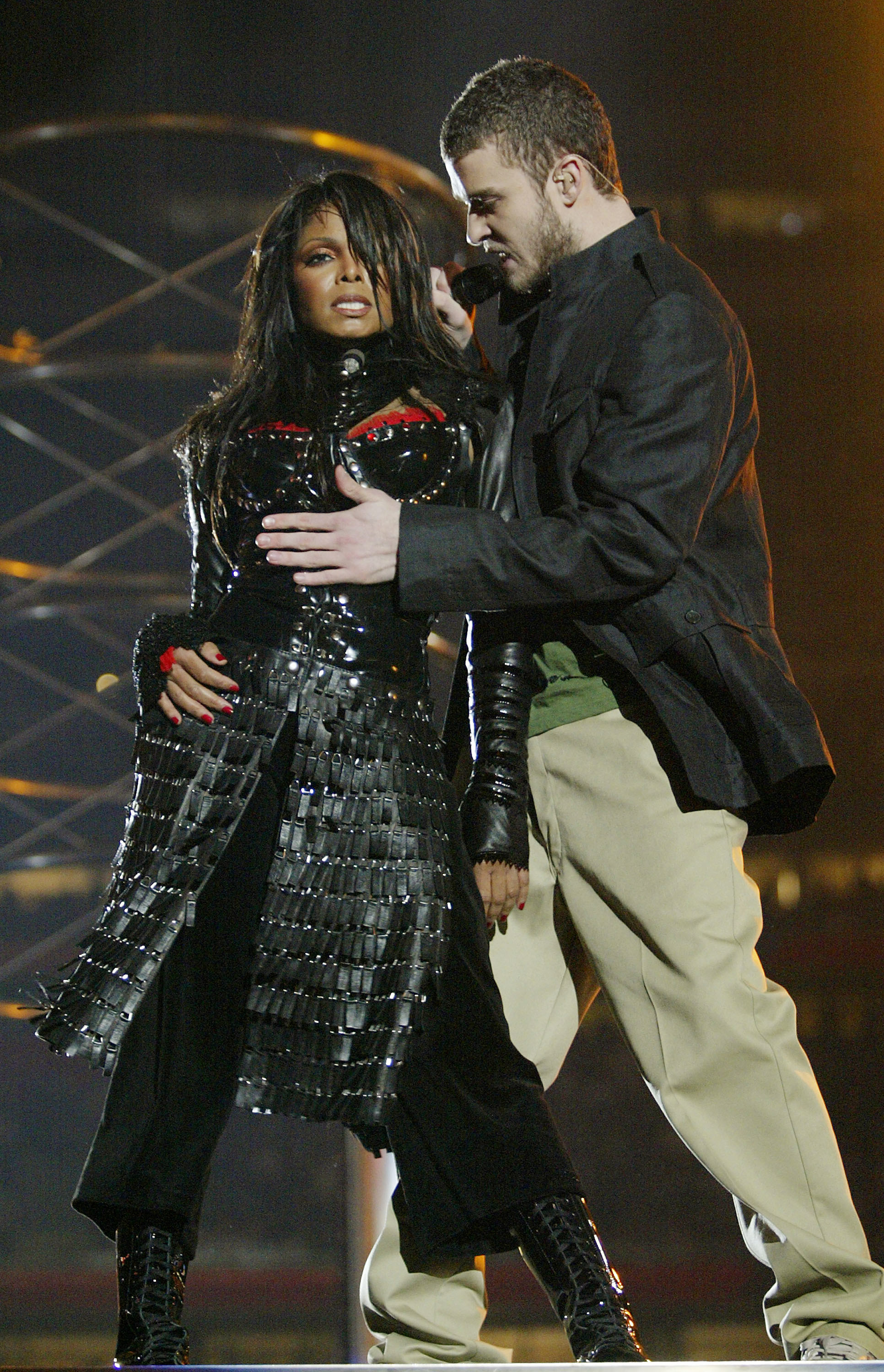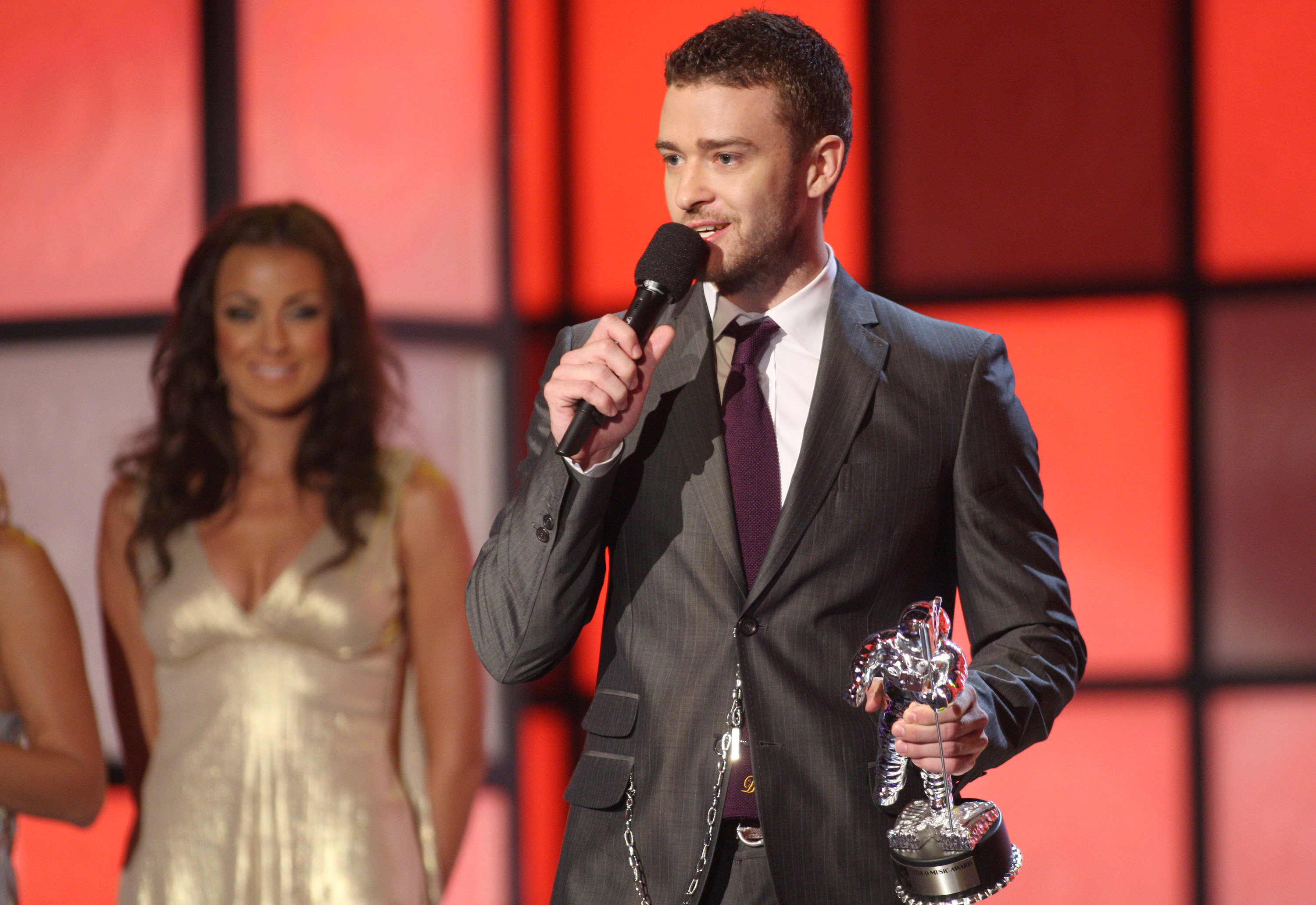
There are a few people who are likely unhappy about how they come off in FX’s new documentary, Framing Britney Spears, but Justin Timberlake gets some of the harshest lighting. It’s maybe the first time in his career that his charm offensive really doesn’t work. Much of the New York Times–produced documentary focuses on who is to blame for Spears’ mental health issues and the conservatorship she seems to want to get out of, and the usual suspects are trotted out: her money-hungry father, ruthless paparazzi who wouldn’t give her a break, Diane Sawyer and her unspeakably cruel questions, society. But the internet does seem to agree on one particular villain: Britney Spears was failed by so many people, but no one did her worse than Justin Timberlake.
Timberlake and Spears were together for just three years, 20 years ago when they were just barely adults. But it was through their tumultuous breakup — and the tabloid fascination thereof — that Timberlake launched his solo career and simultaneously appeared to ruin her life. 2002’s “Cry Me a River” seemed to be all about Spears cheating on him, made worse by a music video featuring a Spears lookalike. “The way people treated her, to be very high school about it, was like, she was the school slut and he was the school quarterback,” says Wesley Morris, a New York Times critic at large, in Framing Britney Spears. “He essentially weaponizes the video for one of his singles to incriminate her in the demise of their relationship.” Does “Cry Me a River” still slap? It absolutely does, but it also seems a lot creepier with context: Timberlake knew that an already hyper-scrutinized Spears would be pummeled if he alleged she had been cheating on him. He did it anyway. Framing Britney Spears puts the pieces together to show that Timberlake was hardly the hero in his own narrative.
But the documentary also forces other questions about Timberlake’s legacy, even as he continues to be wildly successful, rich, and likely to release another record we'll all listen to. When he performed at the Super Bowl with Janet Jackson in 2004, he ripped off her bodice with the intention of revealing a bra and instead exposed her breast on live, international television. Jackson has still not fully recovered from it professionally; she had to apologize repeatedly, she was banned from that year’s Grammys, her music was blacklisted, and her subsequent album tanked. Timberlake didn’t receive the same sort of public punishment. He was even invited back to perform at the Super Bowl in 2018.
At the end of January, Timberlake turned 40. The impish boy band lead, the sexy solo act, the Jimmy Fallon–endorsed cutesy, funny guy — all those versions of Timberlake feel outdated and a little naive. Especially now. Because Framing Britney Spears isn’t just forcing a reconsideration of Timberlake’s relationship with Spears, it also shows how complicit he’s been in the public humiliation and slut-shaming of two huge pop stars. Timberlake needs to reckon with the ways he has let women down. At the very least, shouldn’t he say he’s sorry?

You probably know the story already, since it’s the tale of a lot of child stars turned grown-up heartthrobs. Justin Timberlake was born in Memphis to a musical family; his father led a Baptist choir. At 12, he made it on The All New Mickey Mouse Club along with notable alumni Christina Aguilera, Ryan Gosling, future NSYNC-er JC Chasez, and of course, Britney Spears. By 17, he was part of the boy band NSYNC. If you’re a millennial, you likely know “Tearin’ Up My Heart” and “Bye Bye Bye” by heart. (Can you remember the dance? Of course you can remember the dance.) He began dating Spears in 1999, and they broke up in 2002, plagued by rumors that she cheated on him. These rumors were only compounded by the release of Timberlake’s album, Justified, where “Cry Me a River” was a lead single.
Timberlake needs to reckon with the ways he has let women down.
2002’s Justified had a few hits, and at least one Bubba Sparxxx feature (it was the early aughts, we were all doing upsetting things) — but it was the iconography and context of “Cry Me a River” that made it a huge hit. Dunking on a 21-year-old Spears gave Timberlake’s solo career a boost, mostly because it fed the tabloids with new material. He didn’t just suggest that she had cheated on him in interviews, but he used those suggestions as fodder for getting consumers excited about an album that — who knows! — just might have more details about the world’s most famous ex-couple. “Justin sort of made it seem, rightly or wrongly, like she had cheated on him,” Dave Holmes, a former veejay on MTV, says in the documentary. “It really seemed like he took control of the narrative.”
In the years after their breakup, he did interviews with Regis and Kelly, MTV, Barbara Walters, Ellen DeGeneres, and Oprah (namely during Spears’ mental health crisis, when there was already a tremendous amount of attention on her and what she might do next), tenuously linked to his music but really about his breakup. There are entire supercuts on YouTube of every time Timberlake references Spears, from Saturday Night Live appearances to live performances years after they broke up. If Timberlake was irked by Spears’ 2003 VMAs appearance where she infamously kissed Madonna, he shouldn’t have been — it gave him another year of press where he could sidestep questions about his ex while simultaneously capitalizing on the attention of once being associated with her. And it’s still a fixation, nearly two decades after the fact. On Watch What Happens Live in 2015, Andy Cohen asked producer Timbaland how much he knew about Timberlake and Spears’ relationship. Timbaland is a man in his midforties being asked about a relationship from 1999 between two people barely out of their teen years.
And while Spears spent a good decade having to atone publicly for whatever she did or didn’t do to her teenage sweetheart, Timberlake had to answer for almost nothing when allegations of his cheating on Jessica Biel surfaced back in 2019. After photos of him holding hands (sans wedding ring) with his Palmer costar Alisha Wainwright in New Orleans, Timberlake said nothing publicly until a few days later, when he apologized to his family. “A few weeks ago I displayed a strong lapse in judgement — but let me be clear — nothing happened between me and my costar,” he wrote in December 2019 on Instagram. “I drank way too much that night and I regret my behavior. I should have known better.” The story has largely fizzled, and it’s about as much of a statement that the public could expect over private behavior. Still, it’s certainly not a kind of grace he ever extended to Spears.
Timberlake was not the sole architect of the mental health issues that led to Spears’ conservatorship, but he did nothing to calm the frenzy around her. Why would he? He was benefiting from it. Slut-shaming was nothing new for a pop star in the early aughts — and it’s not like all that much has changed — but it proved to be powerful tool to help him make himself come off as the talented, sensitive, trod-on hero. And then, just a few years later, he did it again.

Jackson’s exposed nipple during the Super Bowl halftime show was news for months on end. The Federal Communications Commission fined CBS more than half a million dollars, a record for “indecency” on television. Michael Powell, then the chair of the FCC, called it “a classless, crass, and deplorable stunt.” CBS, the parent company of Viacom and, thus, MTV, blacklisted her from all of their channels. Her invite to the Grammys — also on CBS — to present a tribute to Luther Vandross was rescinded. Her record released after the event, Damita Jo, tanked compared to her other albums, but not for a lack of positive reviews.
Jackson didn’t just have to apologize — repeatedly — for what happened, but she had to take ownership of it, saying that it was her choice to change the dance and feature a ripped bodice, as if Timberlake hadn’t been the one to tear her bra cup off, exposing her nipple. It was two years later, on Oprah, where Jackson was finally able to spend some time wondering out loud why Timberlake never faced any consequences for his part in the performance and in what became known, charmingly enough, as “Nipplegate.”
“I think they put all the emphasis on me, as opposed to us,” Jackson said. “I consider him a friend, and I’m very loyal. Friendship is very important to me.” At the time, she still wouldn’t take a shot at the guy who left her — literally, as Oprah says — hanging there.
“If you consider it 50-50,” Timberlake told MTV in 2007, “then I probably got 10% of the blame. I think America is harsher on women. I think America is unfairly harsh on ethnic people. I could’ve handled it better.” (Letting his use of “ethnic people” slide here for the sake of my mental health.) Hindsight’s always 20/20, but this renewed understanding of racism and sexism — and how those two forces worked against a Black woman — didn’t make Timberlake bring Jackson onstage at the Super Bowl he performed at years later. But it’s worth noting that Timberlake only got the gig after giving then–CBS CEO Les Moonves a weepy apology. (Moonves apparently also didn’t think Jackson was repentant enough, but I’m sure he currently has a lot of time to think about repentance.)
Timberlake’s career is a story about how far you can get by shirking off any responsibility while watching — or promoting — the ruthless slut-shaming of two women.
For a second time, Timberlake threw a woman under the bus to ultimately advance his own career. “Misogyny — what can you say about misogyny?” Morris says in Framing Britney Spears. “When it’s time for people to come, in a misogynistic culture, for a woman, there’s a whole apparatus ready to do it.”
It’s been nearly 20 years since Timberlake’s breakup with Spears, and 17 years since his Super Bowl act with Jackson. His cancellation is both unlikely and fruitless — and is that what anyone really wants? No one could or should stop you from listening to the last minute of “Like I Love You” when Pharrell comes in, which is objectively one of the best moments of pop music history. An indictment of Timberlake is complicated because it’s an indictment of a society of consumers that elevated artists like him while refusing airtime to Jackson’s Damita Jo.
Timberlake’s career is a story about how far you can get by shirking off any responsibility while watching — or promoting — the ruthless slut-shaming of two women. With both Spears and Jackson, he was complicit — and, worse, he continued feeding the tabloid beast with endless interviews for his own benefit. While Jackson has never fully recovered from the Super Bowl, and Spears still deals with the stigma of her mental health issues, Timberlake thrives. His last tour grossed $225 million. He’s a family-friendly brand whom you can now see in kids movies (full circle!). He became the “chief flavor officer” for some juice company. He’s fine.

It’s only now — thanks to years of #FreeBritney activism and a documentary available on streaming when nearly everyone is home, bored, and looking for something to watch — that anyone’s looking for consequences. It finally seems unlikely that he can skate by, again, without properly reckoning with how he publicly treated his ex-girlfriend and his colleague, both of whom refused to say a bad word about him, even while he refused to defend them.
Justin Timberlake got to do whatever he wanted for years. Someone let this man do a full minute of mediocre beatboxing in “Rock Your Body,” and then we went out and bought the album and thought, Yes, I want to hear this at every wedding I go to for the rest of my life. But he didn’t do any of this alone; he just learned his lesson well: that you can be taller if you stand on the shoulders of a woman with no protection. For many of us, it was easier to just let him win.
And all this time, JC Chasez was right there. What a waste. ●
